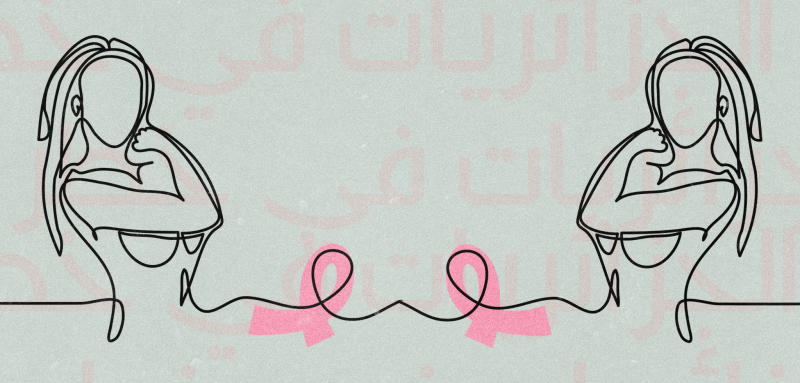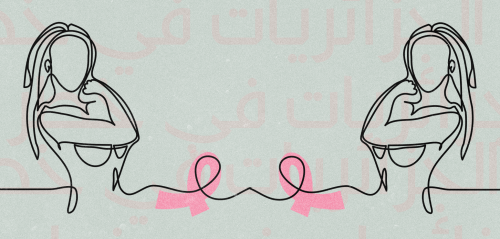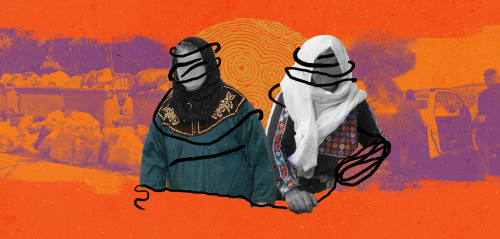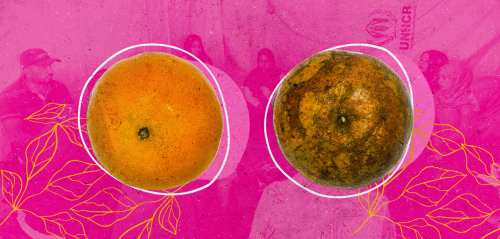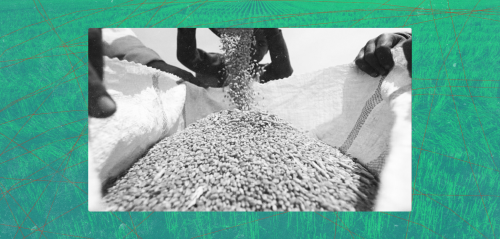"Her body was laid to rest on the night of the birth of the Prophet, peace and blessings be upon him, after breast cancer tore through her body and soul, and the pain settled in her body for good. Now, her seven children will no longer suffer from hearing the crying of their mother, who spent nights upon nights in cold chemotherapy rooms and hospital corridors filled with the smell of death."
This is how Aya began telling the story of her neighbor Nasima, a woman in her forties and a mother of seven, the oldest of whom is in middle school, while the youngest only began primary school earlier this year. She tells Raseef22, "The disease suddenly appeared with the beginning of the Coronavirus pandemic in 2019 and stayed until she passed away a week ago."
Aya recounts the story in a quiet and faint voice overshadowed by a kind of fear and anxiety that the same scenario can happen to her. She says, "One day in the spring of 2019 Nasima visited me, and told me that she was carrying a disease that will prevent her from living her life normally and that she will undergo surgery to remove all of her breast tissue as a way to treat the breast cancer and then start chemotherapy afterwards."
As narrated by her neighbor Aya, Nasima tried to train her psyche to cope with this vicious enemy. She says that she "was under constant pressure, and feeling hopelessness because she was sure that she would come out of the battle defeated, not victorious. She also could not stand the treatment period, especially after the changes in her body, hair, and skin."
Aya adds, "She was crying non-stop in the last days of her life because of her hopeless situation, her emaciated body — the body she used to fill with doses upon doses of anesthesia and pain-relieving drugs so that she would not feel the pain — and over the state of her children, whom she was forced to say goodbye to for good, especially because she knew it was the end."
Breast cancer is the most diagnosed disease in Algeria. One in 9 women may develop this cancer during their lifetime, and one in 27 women will die from it
Expensive treatment
Hamida, a mother of three in her forties, is fighting a fierce war with this insidious disease. Hamida tells Raseef22 of her suffering and says that "it is not just a matter of physical pain, but most women suffering from this cancer are exposed to harsh and difficult mental breakdowns and relapses due to the high cost of treatment."
The woman wonders, "How can I encourage myself mentally to face this wicked enemy, while I am worrying about how my husband will collect the needed money for the tests required after each chemotherapy session and also for the CT scans and X-rays that produce detailed and accurate images of the patient's internal organs in order to know the spread of the malignant disease and whether I will come out victorious or I will be gone for good?"
She goes on, "I was forced to sell the jewelry my father gave me on my wedding night for the treatment and to undergo the necessary tests because my husband's salary isn't even enough to meet the needs and necessities of the house, and sometimes I get treated through donations from my relatives. I was under constant pressure and was overwhelmed by frustration, pessimism, and hopelessness."
According to Hamida, "A woman with breast cancer is already worn out by the shock of discovering the disease and then the relapse following treatment. As a result, she starts to see multiple scenarios in her mind, and some women become delirious, due to a state of cognitive decline and loss of control of themselves, especially if they fail to cover the costs of treatment."
Doctors: Algeria suffers from a lack of opportunities for early diagnosis and detection of genetic mutations that indicate the occurrence of the disease. There is an urgent need for the development of follow-up and early detection programs
Like an epidemic
According to the President of the Algerian Society for Medical Oncology, Kamel Bouzid, the spread of breast cancer in Algeria is on the rise with 12,000 new cases recorded annually.
According to statements made by Dr. Moussai Asia, an oncologist at the Pierre and Marie Curie Cancer Center in central Algeria, during a training course organized by the Roche laboratory for media professionals, breast cancer kills 3,500 Algerian women annually.
It is worthy to note that breast cancer tops the list of cancers prevalent in the country, and the largest percentage of incidence appears before the age of 40, unlike other Western and Arab countries where breast cancer appears after the age of 60 years and above based on figures revealed by the National Cancer Registry.
It affects young women
This figure does not reflect the true number of women with breast cancer in Algeria for several reasons, among which, Dr. Zahzah, a breast cancer specialist, states to be “the lack of tests and procedures used to diagnose this type of cancer, as is the case in European countries, where all women without exception are called for the necessary breast examinations."
"A comprehensive medical examination that includes all women is not available in Algeria because of the lack of resources and capabilities, and has thus prevented the diseases from being contained. Some specialists have compared it to an epidemic because of its rapid spread, acting similar to an infectious disease," Dr. Zahzah tells Raseef22.
Screening campaigns during the month of Pink October are limited to ones carried out by charities and some governmental institutions, like the self-examination and awareness day on breast and cervical cancer organized by the "Youth Stars" association in Algiers Province, as well as the awareness day on breast cancer organized by the Medical Center of the University of Algeria on the importance of self-examination for cancer prevention.
Speaking on some of the characteristics of cancer in Algeria, Dr. Touati Aicha Haram Ar’ar, a specialist in obstetrics and gynecology, tells Raseef22 that "Breast cancer now affects women before they reach the age of 30, and most of them are not married. The youngest cases I have come across during my medical career were of girls between the ages of 25 and 30."
Among the reasons for the spread of breast cancer in Algeria, Dr. Ar’ar points to the genetic factor and says that, "Recent studies have revealed that mutations inherited from fathers also play a major role in the spread of this disease, as it is no longer limited to the mother only."
She goes on to say, "The spread of this cancer is also linked to colon (rectum) cancer and ovarian cancer, as there are common genes that the patient may carry that can make him/her susceptible to these cancers, which is what forces doctors to perform genetic testing on the patient."
Algeria records about 6,500 new cases of colon cancer annually, 3,500 of which are in men and 3,000 are in women, according to the cancer records of the Algerian Institute of Public Health.
This cancer diagnosis has become the first in the most prevalent cancers in general, ranking first in men and second in women after breast cancer.
The leading cause of death in women
"Breast cancer is the number one cause of death in women," said Dr. Meziane Ahlam, a doctor and chief specialist in oncology and radiation therapy, when she was a guest on state radio in Constantine, an Algerian city east of the country.
"More than 50 percent of cancer patients in Algeria are treated for breast cancer. The most vulnerable are those with a genetic history within their families," she said. "These genetic mutations make them more likely to develop this type of cancer."
"Some specialists have compared cancer in Algeria to an epidemic because of its rapid spread, acting similar to an infectious disease"
According to Dr. Ahlam, "The genetic factor in the incidence of breast cancer in Algeria accounts for 3 to 5 percent, and the possibility of girls inheriting cancer is a major concern among Algerian families."
As for the most significant causes of breast cancer, a doctor who specializes in oncology and radiation therapy states that it is "unhealthy foods and saturated fats, while antioxidants are some of the most powerful substances that protect against various types of cancers, and are present in lettuce, olive oil, vegetables, and fruit. Drinking water in an amount ranging from 2 to 3 liters per day is also important, in addition to engaging in physical activity, avoiding obesity, staying away from stress, and reducing the intake of hormonal medications."
Carcinogenic foods
Dr. Manani, a specialist in obstetrics and gynecology, agrees with her, saying, "There are cancer-causing foods including industrial chicken and eggs, as they contain very dangerous hormones that help grow the size of chickens and pose a great risk women who become more likely to develop cancerous tumors in the uterus area or in both breasts."
Among the other most important causes that contribute to the spread of this cancer, according to Dr. Manani, is, "Puberty at an early age, prior to 12 years old, and not being breastfed as a baby, even though breastfeeding is considered one of the most effective ways to ensure the health and survival of a baby."
The doctor further states that, “Breast cancer is the most diagnosed disease in Algeria. One in 9 women may develop this cancer during their lifetime, and one in 27 women will die from it”.
"Over the past three decades, the number of people affected has increased slightly, and this is due to many reasons, such as the lack of early diagnosis campaigns, since making progress in screening, diagnosis, and treatment will reduce the mortality rate," she adds.
One of the most common cancers, the obstetrician and gynecology specialist says, "is ductal cancer, which is the most common non-invasive type of breast cancer in women. It forms inside the breast milk ducts, and has been frequently diagnosed since the widespread use of mammography. And its treatment leads to a full recovery in almost all cases unless the treatment is delayed. If so, it continues to grow until it spreads beyond the milk ducts and thus becomes much harder to treat."
Dr. Manani stresses the "necessity to raise awareness in the media and in mosques, and to organize scientific seminars to raise awareness of the importance of early diagnosis." She says that "some women are unaware that they are carriers of this type of cancer, which is what happened to three patients of mine who discovered their infection after a diagnosis I had done on them by chance."
The specialist doctor says, "It’s unfortunate that there isn’t a clear plan for the detection of breast cancer or what is known as screening. Even the screening devices are insufficient in number in the public or private sectors, not to mention the few and far between chemotherapy appointments, in addition to the high costs of the medical exam and treatment expenses that are only compensated by a small amount from the National Social Security Fund."
Raseef22 is a not for profit entity. Our focus is on quality journalism. Every contribution to the NasRaseef membership goes directly towards journalism production. We stand independent, not accepting corporate sponsorships, sponsored content or political funding.
Support our mission to keep Raseef22 available to all readers by clicking here!
Interested in writing with us? Check our pitch process here!
